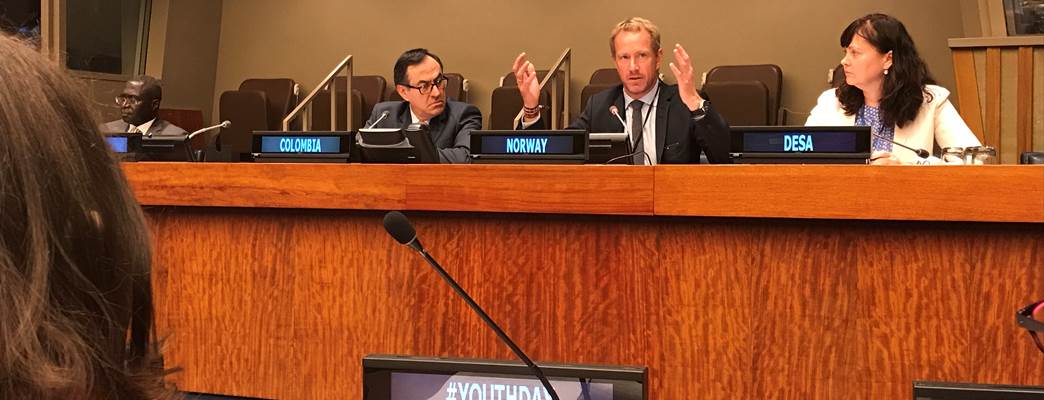Mr Secretary-General, Mr. Under-Secretary General, Excellencies and youth of all ages,
Thank you for inviting me to speak on behalf of Norway at this celebration of the International Youth Day.
I am delighted to explore with you how we can bring the crucial agenda of youth forward in the coming years, in order to sustain peace and reach the Sustainable Development Goals.
Mr. Under-Secretary General Liu Zhenmin, a particularly warm welcome to you on one of the first days in your new job – Norway looks forward to working closely with you.
As other speakers today have mentioned, one of the greatest challenges of today is to build peaceful and resilient societies, that will not dismantle into violent conflict in times of crisis.
And as others have pointed out, this effort will require engaging youth much more genuinely and systematically than we have before.
Security Council Resolution 2250 was indeed groundbreaking as the first resolution of the Council fully dedicated to recognizing the important and positive role that young women and men play in the maintenance and promotion of international peace and security.
It has helped change our thinking, which in turn leads to better action – a power that UN resolutions sometimes have.
We salute the Kingdom of Jordan for having led the way in this process, as a member of the Council in 2015, and we appreciate the close cooperation we have with Jordan on youth issues today.
When we discuss youth at the United Nations, there are three conceptual traps that we need to avoid:
First, the trap of generalities
Since everybody agrees that youth represents the future, we sometimes sort to banal generalities about the role of youth, often based on assumptions that have not been fact-checked.
I am glad to see that since the resolution was passed, we are moving away from this trap, with more and more evidence-based and tailored approaches being developed, not least by the UN.
Second, the trap of negativity
If we only see youth through the lense of conflict - as potential troublemakers or victims - we are bound to end up with unbalanced approaches, that may even be counter-productive.
The approach at this year’s International Youth Day proves that we are steadily moving past this unbalanced narrative.
While we understand better how youth can be vulnerable in the face conflict, we must also understand better how they contribute to positive peace – all the small building blocks that form resilient and prosperous societies.
Third, the trap of gender bias
This bias is sometimes invisible and unconscious, but we know its there. If we are not careful, we risk developing strategies that increase existing gender imbalances. For instance, if we only focus on countering violence, we may subconsciously direct many of our interventions towards boys and young men, and underestimate the role of girls and young women.
I am glad to note that the awareness of the need for more granular and gender balanced interventions has taken a solid hold here at the UN, and I am sure this will be among the themes discussed later.
Now a few words from Norway’s experience, following resolution 2250, in particular on how to enhance the role of youth in preventing and countering violent extremism.
- In June 2015, Norway’s Prime Minister Erna Solberg hosted an International Conference on Youth against Violent Extremism.
- Following that landmark event, Norway has supported the Youth Civil Activism Network (YouthCAN), launched at the Conference.
- YouthCAN equips young people with skills, opportunities, networks and resources in order to build resilience within their communities. 1 000 members across 125 countries, and the network is still growing.
- So-called Innovation Labs (platforms for networking and skills building) have since taken place in Amsterdam, Budapest, Madrid, London, Oslo and Tunis.
- Last year, with Norwegian support, YouthCAN conducted a survey on the UN Secretary General’s Plan of Action to Prevent Violent Extremism and Security Council Resolution 2250. More than 100 young people from 43 different countries participated. A key recommendation was the need to invest in the education, capacity building and skills development of young people.
- Norway supports the Global Solutions Exchange-event in the margins of UNGA in September 2017. The event will highlight innovative ways young women, men and youth-led organizations can contribute to local PVE efforts.
- Education is key, and Norway has made education a top priority for our development cooperation.
Finally, dear friends, Youth CAN lead and inspire, as the following example will highlight:
In 2014, Muslim youth in Norway organized a rally against violent extremism and gathered in front of the Norwegian Parliament.
Less than a year after, Norwegian Muslim youth organized a ring of peace around the synagogue in Oslo, and event that resonated across the world.
Both events confirmed the important role youth can play in upholding our common values. You have a chance to make a difference.
At a national level, we have worked hard to include youth voices in policymaking, but we can do more
Moving forward we should continue to address the institutional barriers youth face at the local level. Involving local actors - beyond capital cities - in this work is crucial.
Thank you! Good luck with your meetings, and have a lot of fun while you are here!
